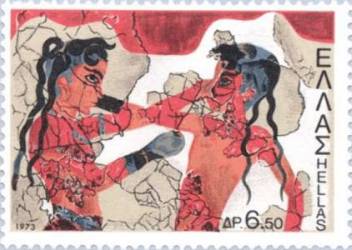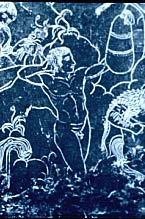|
|
Olympic Games
Michael Lahanas
Αρχαία Ελλάδα : Ολυμπιακοί Αγώνες
|
    
For men and boys (paides)
- 1 Stadion (στάδιο)(since 776 BC, first winner Coroebus of Elis , a mageiros (a priest ?) interpreted by some as a cook)
Running 600 feet or 1 stadium. (up to 20 athletes)
- Diaulos (δίαυλος) (since 724 BC, 14th Olympiad, first winner Hypenus of Elis ):
2 Stadia, i.e. 1200 feet distance. The runners had to turn around the post at the far end and then return.
- Dolichos (δόλιχος)(long race) (since 720 BC, 15th Olympiad, first winner Acanthus of Laconia)
Around 7-24 Stadia? or around 1.5 - 5 km. For all races one has to consider that the running was performed without shoes on sand which can be painful (Try and see!). For men I assume running nude can be painful also for another reason. A solution of this problem was probably the so-called kynodesme a leather strip binding the penis (called by the Athenians kyon or dog). An image of an athlete with a
 
a) Boxing of Minoans and b) box training of Polydeukes with a korykos (300 BC)(
Pentathlon (πένταθλον) since 708 BC, 18th Olympiad first winner Lampis of Laconia. Penta means five in Greek and the Pentathlon athletes had to complete 5 events (not all necessary as winning three events was enough and the remaining events were canceled). Probably wrestling was the last event of the Pentathlon. Boys’ Pentathlon held only in 628 BC. According to Philostratus it was
|